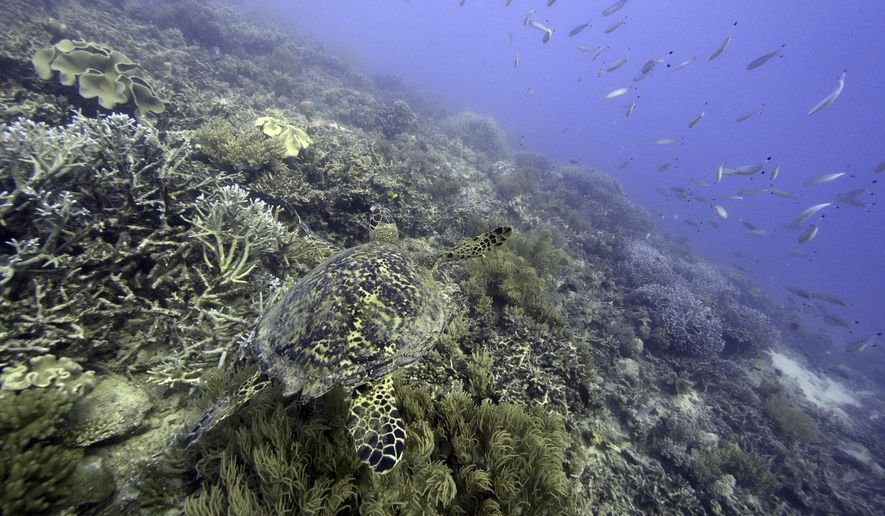
A sea turtle swims over corals on Moore Reef in Gunggandji Sea Country off the coast of Queensland in eastern Australia on Nov. 13, 2022. The Great Barrier Reef, battered but not broken by climate change impacts, is inspiring hope
By Brad Matthews -
The Washington Times -
Saturday, March 16, 2024
A newly discovered species of extinct, fossilized freshwater turtle discovered in the Amazon rainforest in Brazil was named for Maturin, a character from the works of novelist Stephen King.
The fossil was given the scientific name Peltocephalus maturin by a multinational team of researchers. Maturin is a giant cosmic turtle featured in Stephen King’s novel “It” as well as his “Dark Tower” series in which it’s credited with the creation of the universe.
A newly discovered species of extinct, fossilized freshwater turtle discovered in the Amazon rainforest in Brazil was named for Maturin, a character from the works of novelist Stephen King.
The fossil was given the scientific name Peltocephalus maturin by a multinational team of researchers. Maturin is a giant cosmic turtle featured in Stephen King’s novel “It” as well as his “Dark Tower” series in which it’s credited with the creation of the universe.
The turtle dated to the late Pleistocene geological era 40,000 to 9,000 years ago, meaning it lived alongside people, per a release from the Senckenberg Center for Human Evolution and Palaeoenvironment at the University of Tubingen in Germany.
“Age inferences pinpoint Peltocephalus maturin as the latest giant freshwater turtle, inhabiting the Amazonian rainforest on the fringe of human arrival,” the researchers wrote in their introduction to their study about the turtle, published in the British journal Biology Letters.
Researchers believe Peltocephalus maturin was one of the largest freshwater turtles on record. While the current largest species have carapaces no longer than 55 inches, the fossil turtle’s shell is estimated to have been 70 inches long.
Lead author Gabriel Ferreira, a paleontologist at the University of Tubingen, told CBS News, “What would our ancestors have thought if they really saw such a giant alive? Would they be afraid of it? Would they hunt it for food or worship it? Or both?”
The study connects the extinction of Peltocephalus maturin to the period’s loss of other large animals, such as the wooly mammoth and saber-toothed tiger, caused in part by humans hunting them too much.
“Human predilection for giant turtles, for example, has been linked to body size decline in tortoises … and the overexploitation of island species leading to their extinction is well documented,” the study’s authors wrote.
No comments:
Post a Comment